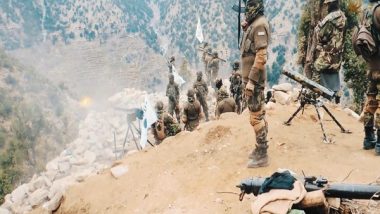Islamabad [Pakistan], February 17 (ANI): Amid Pakistan's economic crisis and the Taliban's rule in Afghanistan, the banned Tehreek-i-Taliban Pakistan (TTP) has re-emerged as a potential threat to Islamabad, Dawn reported citing the US Institute of Peace's (USIPs) report.
"Amid Pakistan's economic crisis and the Taliban's rule in Afghanistan, the TTP has re-emerged as an increasingly potent threat," warned the report, released in Washington on Tuesday by the US Institute of Peace (USIP).
USIP argued that the Taliban's response to being confronted about their support for the TTP has been to level counter-accusations.
USIP report fears Pakistan's deteriorating economy will limit its ability to act against terrorists
Also Read | Earthquake in Turkey and Syria: Death Toll Surpasses 41,000 as Rescue Efforts Continue.
Such rhetorical signals are matched by anecdotal reports from UN officials and other observers -- quoted in the USIP report -- of TTP individuals moving freely and conducting business in Afghan cities.
Interlocutors with access to Kandahar report that the Taliban emir and his close advisers were "unlikely to waiver in supporting the TTP on ideological grounds," the USIP report noted.
Referring to Kabul's recent criticism of Islamabad's policies, the report argued that "this undiplomatic rhetoric underscores the Taliban's determination to continue supporting the TTP, even in the face of intensified pressure from Pakistan".
According to the report, the other fact that affected the Pakistani response is the country's deteriorating economy. Pakistan's economy is on the brink of default, reported Dawn.
"That limits Pakistan's military options. Pakistan can carry out raids and undertake defensive actions inside the country, but it doesn't have the resources for a sustained high-intensity campaign," USIP warned.
The report noted that "Pakistan has flirted with the idea of cross-border airstrikes again," which it last conducted in April 2022 and it also faced "growing pressure for action," but seemed reluctant to act.
The pressure came from political groups in Pakistan who were "framing the terrorism resurgence as a conspiracy by the military to block former prime minister Imran Khan's return to power and to get American aid," the report added.
But the report argued that economic pressures and the risk of a conflict spiral, especially amid reports of Taliban fighters joining the TTP, "may induce doubts in Pakistan about such a cross-border operation," according to Dawn.
The TTP's escalating campaign of violence "is a function of its growing political and material strength -- reflected in its political cohesion, expanding cadre of trained fighters, suicide bombers, weapons, and equipment," the report added.
"The Afghan Taliban remain very supportive of the TTP and are providing the group with a permissive safe haven," the report claimed. It noted that the TTP also had a lot of popular support in Afghanistan, "where both Taliban and non-Taliban constituencies get behind the TTP due to a fervent dislike for Pakistan". (ANI)
(This is an unedited and auto-generated story from Syndicated News feed, LatestLY Staff may not have modified or edited the content body)













 Quickly
Quickly
















